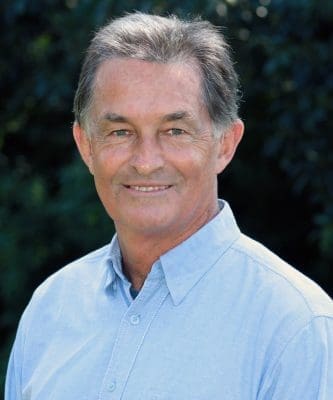A career spanning almost 50 years in teaching and leading tropical pasture and agroforestry research was celebrated at a dinner in Brisbane earlier this month.
Dr Max Shelton from the University of Queensland is one of Australia’s leading plant scientists, with a footprint of work extending from Australia to South East Asia and Central America.
He has been responsible for the release of new varieties of leucaena to the grazing industry which now constitute more than half of all leucaena planted.
This article is based on a tribute delivered to last Saturday night’s dinner by plant scientist Dr Scott Dalzell, who has studied under and worked with Dr Shelton for the past 25 years.
Max’s career began in 1968 when he graduated with honours from an agricultural science degree at the University of Queensland.
He then undertook a PhD program involving the integration of stylo pastures in farming systems in North East Thailand.
For several years after graduating he continued working in Thailand at Khon Kaen University and Bangkok with the Land Development Department, and in the process he mastered the Thai language.
In 1978 Max returned to his alma mater and worked in the Department of Agriculture at UQ in the role of overseas post-graduate student coordinator. This was a challenging role, occurring during a period of intense international agriculture higher degree training, with more than 100 international post-grad students enrolled each year.
In 1986 Max took up the tenured position of lecturer in pasture science, the role from which he will retire as associate professor on December 31 this year.
During that period Max continued and enhanced UQ’s reputation as a centre of excellence in tropical pasture, forage and agro-forestry training and research.
Key statistics demonstrate Max’s prodigious academic output:
- Graduating 35 research higher degree students (Masters and PhD)
- Supervising 41 coursework masters student research projects; and
- Supervising 58 undergraduate fourth year student research projects.
From this body of work arose:
- Five edited books;
- 140 journal and conference papers;
- Numerous national and international guest lectureships; and
- The release of four pasture plant varieties – Sesbania cv Mt Cotton and Leucaena cvv Tarramba, Wondergraze and Redlands
Somewhere between 6000 and 7500 undergraduate students from Agriculture/Natural Resource Science and Veterinary Science attended Max’s pasture science and agroforestry lectures.
It is a tribute to Max’s enthusiasm that he won accolades (as nominated by the student body) and continues to receive very positive student feedback evaluations for his teaching courses.
Max has also made a significant contribution to the broader community through other training activities and R&D programs including:
- The delivery of Leucaena training courses to more than 600 Australian graziers;
- In partnership with Ross Gutteridge in the 1990s, the delivery of five extremely successful AUSAID funded tropical forage training courses to international university/government department personnel; and
- Enhancing the economic and social well being of smallholder farmers from Max’s direct and indirect contributions to international rural development programs, delivering immeasurable benefits.
Max’s research career has covered a diverse range of Research, Development and Extension topics.
Here is a snapshot:
- Stylos in Thailand;
- Legume pastures in the Pacific and under plantations in Indonesia and Malaysia;
- Forage peanut in Bali;
- Tree legumes in Indonesia, PNG, Philippines, Vietnam, Thailand and Mexico;
- All things Leucaena (in all parts of the world) – agronomy, genetics/breeding, grazing/systems management, animal nutrition, Leucaena toxicity, extension and adoption.
This work was funded through numerous agencies and private companies including AUSAID, ACIAR, MLA, Santos GLNG, ACARP, Comalco, Government grants, UQ grants and international student scholarships.
He has undertaken several overseas sabbaticals during his career including at the University of Hawaii in 1991, Oxford Forestry Institute in 1995, the UN’s Food and Agriculture Organisation in Rome in 1999 and the University of Florida in 2009.
Max has also fulfilled numerous roles within UQ on different committees and in professional and industry associations, including president and fellow of the Tropical Grassland Society, and was a founding member and technical advisor to The Leucaena Network.
Max successfully collaborated throughout his career with many colleagues at UQ, DPI and CSIRO from a diverse range of specialised fields. Many of his Max’s students have also risen to important positions within universities, government departments and agencies and in the private sector.
He has also enjoyed working with, and learning from, innovative Queensland graziers and industry peers.
Dr Dalzell said he admired Max’s investment in the professional development of young people, his passion for agriculture, and his work ethic and integrity.
“Max only works on projects that he believes are relevant and will make a difference, and he is forthright if he thinks otherwise,” Dr Dalzell noted.
He said the impact of Max’s career both in Australia and overseas had been significant, and would continue through the ongoing contribution of his many students.




I had a very productive, and appreciated, visit from Dr Shelton and Dr Poppi when I managed the family cattle property in Papua New Guinea
It will be great for AusAid to bring him to the Philippines. Perhaps to be a guest speaker during the next Beef Congress sometime in April 2017. Maybe the Australian Embassy in Manila should contact the Federation of Cattle Raisers in the Philippines.